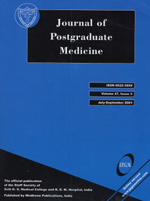
|
Journal of Postgraduate Medicine
Medknow Publications and Staff Society of Seth GS Medical College and KEM Hospital, Mumbai, India
ISSN: 0022-3859 EISSN: 0972-2823
Vol. 51, Num. 2, 2005, pp. 90-91
|
Journal of Postgraduate Medicine, Vol. 51, No. 2, April-June, 2005, pp. 90-91
Expert's Comments
Communication skills and postgraduate medical training programs
Keen A.
Department of Psychology, College of Life Sciences and Medicine, University of Aberdeen
Correspondence Address: Department of Psychology, College of Life
Sciences and Medicine, University of Aberdeen,
Email: andrew.keen@arh.grampian.scot.nhs.uk
Code Number: jp05034
It is now widely acknowledged that doctors require good communication skills to be able to deliver appropriate, high quality medical care. Research has helped to elucidate some aspects of this complex topic. We know, for example, that some doctors in training possess better communication skills than others and that shortcomings are commonplace. Furthermore, we know that although the impact of initial medical posts affects different doctors in dissimilar ways,[1] clinical experience alone does not address deficiencies. Thankfully, training programmes that utilise appropriate teaching methods do result in lasting, significant improvements in the communication skills of both relatively junior and senior doctors.[2] However, almost all published research has been conducted in the USA, Canada and Western Europe. It would be unwise to assume that results generalise across different cultures. They may not. For example, it may be the case that patients in different parts of the world have distinct expectations and desires about how they would like their doctors to communicate. Similarly, depending on their location, young doctors may face substantial yet diverse barriers to developing their communication skills. Consequently, the authors′ contribution[3] to the literature is most welcome.
There are two aspects of this paper that are especially noteworthy. First, the extent to which residents believe they posses relevant attributes is worthy of study, although under-researched. In view of the continuing drive toward self-directed learning, accurate self-reflection is essential if doctors are to address shortcomings. Unfortunately, doctors and other health professionals are poor at judging their own communication skills. Nevertheless, although perhaps erroneous, self-perceptions might be extremely influential in doctors′ decisions about whether or not to seek communication skills training. A coherent, structured, ongoing communication skills training program, as suggested by the authors, might help overcome this problem. Second, the uniformly low ratings of residents regarding their ability to communicate with their senior colleagues, is worrying. In other research, doctors have indicated they are more influenced by the way senior colleagues communicate in hospitals than by formal communication skills teaching delivered in the classroom. Moreover, residents have revealed that a lack of support from senior medical colleagues to be a significant barrier to delivery of effective communication to patients.[4] Clearly, senior doctors play a crucial role in the education of residents. This article suggests that improvements in communication across medical grades would be helpful in many ways. If this does not occur, then the effectiveness of the authors′ recommendations on the provision of communication skills training could be seriously compromised.
REFERENCES
| 1. | Keen AJ, Klein S, Alexander DA. Assessing the communication skills of doctors in training: reliability and sources of error. Adv Health Sci Educ Theory Pract 2003;8:5-16. Back to cited text no. 1 [PUBMED] [FULLTEXT] |
| 2. | Fallowfield L, Jenkins V, Farewell V, Solis-Trapala I. Enduring impact of communication skills training: results of a 12-month follow up. Bri J Cancer 2003;89:1445-9. Back to cited text no. 2 |
| 3. | Avan BI, Raza SA, Afridi H. Residents' perceptions of communication skills in postgraduate medical training programs of Pakistan. J Postgrad Med 2005;51:85-9. Back to cited text no. 3 |
| 4. | Dosanjh S, Barnes J, Bhandari M. Barriers to breaking bad news among medical and surgical residents. Med Educ 2001;35:197-205. Back to cited text no. 4 |
Copyright 2005 - Journal of Postgraduate Medicine
|
